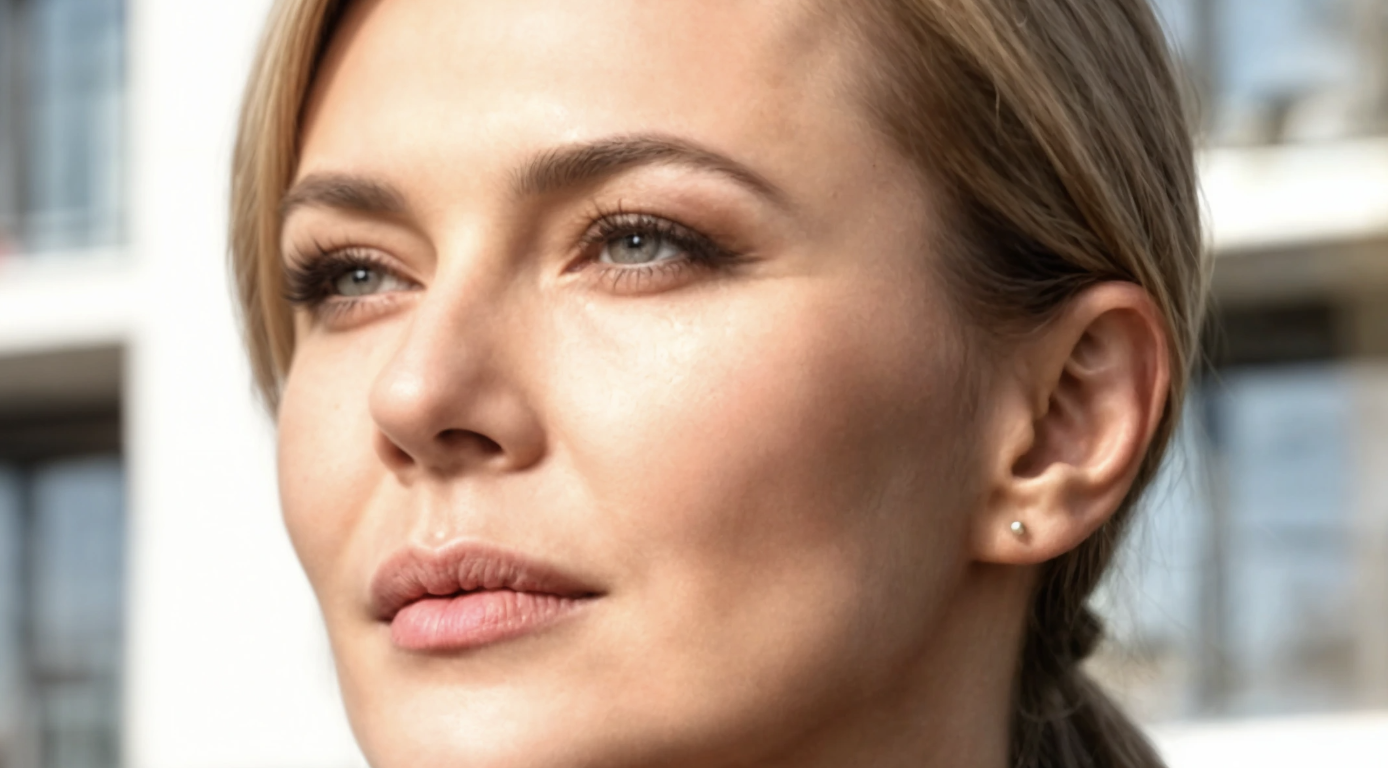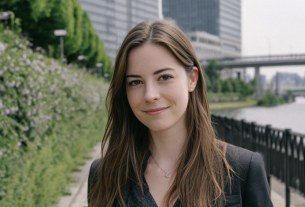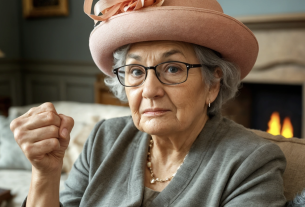They were sitting at my table. In my house. Though I had never truly felt it was mine. Not until this evening.
My sister-in-law Sveta, adjusting her heavy gold earrings, surveyed the dining room with the air of an appraiser, as if gauging how much the oak wall panels might fetch.
Her husband Vadim, the elder brother of my late husband, was already drumming his fingers impatiently on the gleaming wood. His gaze kept sliding toward the antique sideboard.
And at the head of the table, in Dima’s place, sat her. Larisa Petrovna. My mother-in-law.
She looked at me with her habitual expression of mild, condescending disappointment, the one that hadn’t left her face for the past ten years. As if I were a bad purchase, a defective item that couldn’t be returned.
“Well, Katenka, we’re waiting,” she said in a deceptively gentle voice, with that same steel in it I knew so well. “We can’t wait to try whatever you’ve prepared to surprise us today. After everything… you need a distraction.”
I nodded silently and went to the kitchen. The air there felt different. Clean.
On the tray stood expensive porcelain plates with the family monogram Larisa Petrovna loved to show off.
I took a ladle and scooped from a galvanized bucket the murky water that smelled of pond scum and river silt. Here and there on the surface little leaves and bits of debris rocked lazily.
The smell was revolting. Earthy. Stagnant. The smell of the riverbed.
I returned to the dining room. The stench of rot drifted through the room, brazenly mingling with the scent of their expensive perfume and my hypocrisy.
I set the first plate before Vadim. He stared at the brownish slurry, his face lengthening into a mask of bewilderment.
“What is this?” he croaked, edging away from the table.
I didn’t answer. I simply took the next plate and set it before Sveta. She recoiled, theatrically clapping a hand to her mouth. Her eyes went wide with horror and incomprehension.
They looked from me to their plates and back again. On their faces bewilderment, disgust, and a nascent, almost righteous anger chased one another.
“Katya, is this some stupid joke?” Sveta squealed. “Get this out of here right now! Have you gone mad from grief?”
But I was already walking toward Larisa Petrovna. Her place was still empty. She was staring straight at me, not looking away. There was no fear or surprise in her eyes. Only the cold, appraising fury of a predator who realizes the prey is no longer afraid.
She waited.
“I’ve served everyone the same dish,” I said, my voice coming out steady and unexpectedly calm. “But for you, Larisa Petrovna, I have a special course.”
I left the tray on the sideboard and walked out again, leaving them alone with the dirty water and their thoughts. Let them sit. Let them think. Let them breathe that smell.
Because I hadn’t brought out the main course yet.
I returned a minute later. Without the tray. I simply stopped in the doorway, arms folded across my chest, and watched.
Vadim cracked first. He shoved his plate away, and a few filthy drops splattered onto the snow-white tablecloth, leaving ugly stains.
“Have you lost your mind?” he barked, jumping to his feet. His face had gone purple. “We came to support you, and you put on this circus!”
“Support me?” I tilted my head slightly. “Is that what we’re calling it now? Coming to assess what can be carted off from here?”
“How else? We’re worried!” Sveta chimed in. Outrage made her voice tremble. “We thought you were alone, having a hard time… And you! You poured slop onto our plates!”
“It’s not slop,” I corrected evenly. “It’s just dirty water.”
I remember how Dima once brought home a puppy. Small, funny, with enormous ears. He found him at a construction site. The puppy was filthy and frightened.
When Larisa Petrovna saw him, she grimaced as if she’d seen a rat. She took the bowl I had already filled with clean water, dumped it on the floor, and filled it from the bucket I used to wash the porch.
She set it before the puppy. Dima looked away. His silence hurt more than her words.
“Here,” she said then, looking at me. “To each creature according to what it deserves. The dirty—from a dirty dish.”
Dima said nothing. But I remembered.
“Katya, stop this masquerade,” Larisa Petrovna said at last. She was the only one who hadn’t raised her voice. She struck with words. “Dima wouldn’t have approved. He would be ashamed of you now.”
“Dima is gone,” I cut her off. “And his shame no longer concerns me. Nor his approval. All that concerns me now is justice.”
I stepped to the table and picked up the empty plate set at my mother-in-law’s place.
“You’ve always thought you knew what everyone deserved,” I said, meeting her eyes. “You decided what kind of wife Dima should have. What kind of job he should have. Even what kind of dog.”
Sveta gasped. Vadim frowned, trying to see where I was going with this. Only Larisa Petrovna’s face didn’t change. She was like a statue carved from cold marble.
“You’ve always fed me what you deemed necessary. Reproaches. Unasked-for advice. Contempt you didn’t even try to hide. You fed me that for ten years.”
I paused, letting the words soak into the expensive upholstery of the chairs, the heavy velvet drapes, the very air of this house that had never truly been mine.
“You’re used to me swallowing it and keeping quiet. But today I decide what’s on the menu.”
I turned and went back to the kitchen. For her dish.
The smell from the bucket no longer seemed so disgusting. It smelled like memory. Like every tear I’d shed. Every insult I’d choked down.
On the kitchen table lay an old, yellowed tablecloth. The very one Larisa Petrovna had once called “peasant tackiness” and ordered me to throw away.
And on the tablecloth stood it. My special dish.
I returned carrying not a porcelain plate but an old enamel bowl. Blue, with chips around the rim that showed rust.
That very bowl. The puppy’s.
I set it down with a soft clink right in front of Larisa Petrovna. On the immaculate white tablecloth, next to the crystal glasses.
Sveta and Vadim froze, staring at the shabby vessel in utter bewilderment. But my mother-in-law wasn’t looking at the bowl. She was looking at its contents.
There was no food in the bowl. There was a handful of gray ash.
“What is…,” Sveta whispered, leaning over the table. “Katya, what is that?”
“This, Svetochka, is called ‘dessert,’” I replied, not taking my eyes off Larisa Petrovna. “The dessert they serve at the end of a long, very long dinner. A ten-year dinner.”
Slowly, very slowly, Larisa Petrovna raised her gaze from the ash to me. Her lips pressed into a thin, bloodless line. She understood everything. She recognized it.
“Remember how you advised me to burn all my student paintings?” I asked softly, almost tenderly. “You said that ‘daubing’ only gathered dust and disgraced your family’s good name. That an engineer’s wife shouldn’t be wasting time on such nonsense.”
Vadim blinked. He remembered. Back then he even laughed and told Dima that their mother was right, that it was time for me to “do something useful.”
“I listened to you,” I went on. “I burned almost all of them. But I kept one, the very first. I burned it this morning. Here it is.”
I tipped the bowl slightly. The light ash puffed up and settled again.
“That’s the first ingredient. The ash of my dream.”
I straightened, went to the sideboard, opened the top drawer. I took out a small velvet pouch and poured its contents into the same bowl.
With a dry clatter a handful of small river stones fell onto the ash.
“And this is the second ingredient. Remember our trip to the river? When Dima gave me a pendant for our anniversary, and you said I had no taste and that only… women of a certain sort wore such things.”
Sveta looked away. She’d been there too. She had nodded along.
“That same evening I threw the pendant into the river. I remember how it flashed coldly on the path of moonlight and vanished. And later, after you’d all gone, I came back and crawled along the shore all night looking for it. I didn’t find it. I gathered these stones instead. From the bottom. Where it lies.”
I looked at my mother-in-law. Her face had taken on the color and texture of old parchment.
“This is the price of your words.”
Vadim was starting to understand. His self-assurance evaporated, replaced by unease. He looked to his mother for support, but she sat in stony silence.
“And finally,” I took a folded sheet of paper from the pocket of my apron. It was old, its creases worn thin. “The main component. What will give this dish its piquancy.”
I unfolded it. It was the deed of ownership. For this house.
“Dima transferred everything to me. A week before… the accident. He said he was tired of watching you turn my life into hell in my own home. He said it was the only thing he could do to help me finally feel like the mistress here.”
I laid the document on the table beside the bowl.
“You are sitting at my table. In my house. And you are eating what I serve you. Mud. Ash. Stones. Everything you fed me all these years.”
A dead, ringing silence fell.
“So, bon appétit, Larisa Petrovna. Your dish. Eat.”
Sveta recovered first. She leapt up, knocking over her chair, which crashed against the parquet.
“It’s a fake!” she screamed, jabbing a trembling finger at the document. “You’re lying! Mama, she’s lying!”
Vadim rose too, though less abruptly. He snatched up the paper and his eyes darted over the lines. Greed and fear battled there. He understood that I wasn’t lying. Dima was capable of such a thing. A quiet, desperate revolt.
But Larisa Petrovna didn’t move. Slowly, very slowly, she reached out and took the paper from her son.
Her fingers slid over the lines, over her son’s signature, over the notary’s blue seal. She wasn’t reading. She was saying goodbye— to the house, to power, to the illusion of control over her younger son’s life.
Then just as slowly she put the paper back on the table. She lifted her eyes to mine, and the steel was gone. Only a scorched, empty hatred remained.
“You’ll regret this,” she hissed.
“I’ve regretted things for ten years,” I said. “I’m done.”
She stood. Without looking at anyone else, she turned and headed for the door. Not like a queen leaving her throne room, but like a thief caught red-handed. Her shoulders hunched.
Sveta and Vadim rushed after her, muttering about lawyers, about court, about how they wouldn’t let this stand. The front door slammed.
And everything went quiet.
I was alone in the dining room. Among the dirty plates, the overturned chair, and the smell of river mud. I felt no triumph, no joy. Only a huge, all-consuming emptiness.
As if the spine that had kept me upright all these years had been pulled out. Revenge proved a bitter dish not only for them.
I didn’t clear the table. I simply went to Dima’s studio. He had given me a small room on the second floor for it, and it was the only place in the house my mother-in-law almost never entered, sniffing that it was a “mess-maker’s den.”
It smelled of turpentine and oil paints. An easel stood there with an unfinished portrait of our dog—the same puppy grown into a huge, gentle, shaggy beast.
I took a clean canvas. The largest I had. I took a jar of white paint. And I began to cover it with steady, wide strokes. White over white. Layer upon layer.
I wasn’t trying to paint anything. I was just painting over the past. Erasing emptiness with emptiness.
They didn’t go to court. Their lawyer must have explained how hopeless it was. Vadim called a couple of times, trying first to threaten, then to appeal to my conscience. I hung up without a word.
Six months later I sold the house. I closed the deal without haggling, just to be done. On the day the new owners moved in, I sat on the front steps and watched strangers carry their boxes into my former rooms. I felt nothing.
I bought a small apartment with high ceilings and huge windows on the top floor of an old building. And the entire wall in the living room was taken up by that very canvas.
It remained white.
Sometimes a few friends come over. They look at the white wall and ask what the painting is. Or whether it’s just a preparation for one.
“It’s my special dish,” I tell them. “The recipe is very simple. You take ten years of pain, a handful of ash, add a few stones from the riverbed, and paint it all over with white. What you get is… nothing. And in that ‘nothing’ you can finally breathe.”
It isn’t a painting. It’s empty space. Mine. For the first time in my life. And I still haven’t decided whether I want to paint anything on it.



